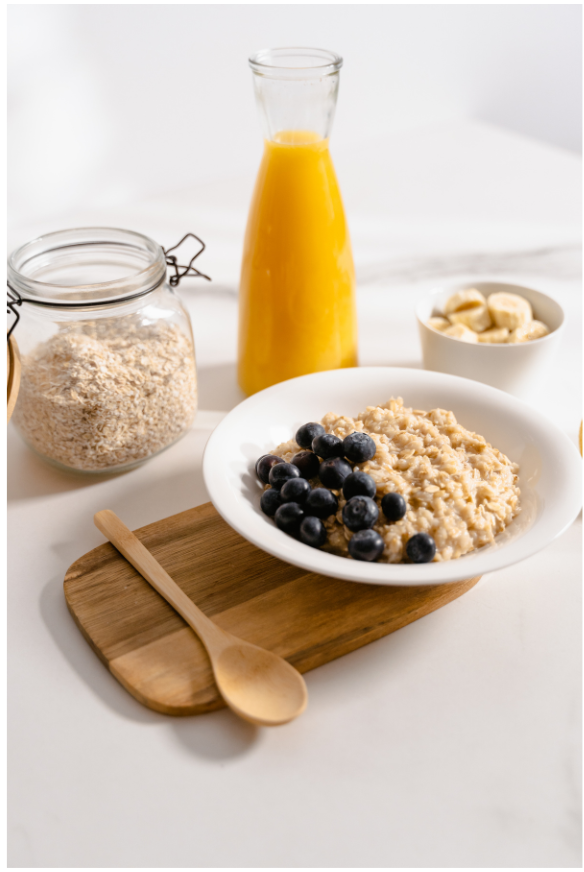The 3 improvements in your diet that are discussed in this article are the nutritional foundation you need for greater energy and focus.
As a high-achieving woman, it’s especially important that you support yourself with optimal nutrition.
When you are committed to projects, goals, and your dreams, you need the right fuel each day to meet the demands.
However, since there is much to do and think about, your eating can become a lower priority in your day.
Many people struggle with low energy simply because their dietary habits don’t support optimal energy levels.
Good energy relies on good nutrition. With plenty of energy, you can focus, produce great work, and get things done efficiently.
In this article, you will learn how these 3 targeted improvements in your diet give you more energy naturally.
By making these improvements, you get the right nutrition throughout the day so that you feel your best, look your best, and show up your best in life.
1. Prioritize Whole Foods Over Processed Foods
The first of 3 improvements in you diet is to prioritize whole foods over processed foods.
First, we explain the difference between between them.
Then, we explain how they impact your energy and what to choose to fuel yourself well.
Processed Foods
Processed foods are foods that undergo basic changes to enhance flavor, shelf life, or convenience.
This might involve adding salt, sugar, or oil, but processed foods typically have only two or three ingredients.
Examples of these foods include canned vegetables, canned fish, fruits in syrup, and freshly baked bread.
Ultra-Processed Foods
Ultra-processed foods are foods that are greatly altered from their original, natural state and have a much lower nutritional value.
They undergo extensive processing and often contain a long list of ingredients, including added sugars, salts, fats, and various artificial colors, flavors, or preservatives.
These foods are usually made with refined ingredients like hydrogenated fats and starches, as well as additives to improve taste, texture, or stability.
Common examples include frozen meals, soft drinks, packaged cookies, and salty snacks.
Whole Foods
In contrast, whole foods are unprocessed or minimally processed foods that retain their natural vitamins, nutrients, and structure.
These foods may be slightly modified through methods like drying, boiling, freezing, or pasteurization to make them safer to store and consume.
However, they are not drastically changed from their original state.
Examples of unprocessed or minimally processed foods include fresh or frozen produce, raw meats, unsalted nuts, and whole grains.
The Harvard Health Blog recommends that everyone learn to identify processed foods, and whenever possible, try to avoid or limit ultra-processed foods.

The Energy Impact of Processed Foods
Processed Meats
Deli meats, bacon, and sausage, are often high in saturated fats, sodium, and preservatives like nitrates.
While they provide some protein, they lack the essential nutrients and quality protein that whole food sources, like lean meats and plant-based proteins, offer.
The high sodium levels of processed meats can contribute to dehydration, which is a common cause of fatigue.
Additionally, these meats can be harder to digest due to the added fats and preservatives, causing your body to expend more energy on digestion rather than fueling your body efficiently.
Processed Grains
White bread, white rice, and sugary snacks, have been stripped of fiber and essential nutrients.
They are often packed with added sugars to improve taste, but they lack the slower-digesting carbohydrates found in whole grains like oats, quinoa, and whole-grain bread.
The lack of fiber and nutrients in processed grains causes a spike in blood sugar, leading to a short-lived energy boost followed by a crash.
This energy rollercoaster drains mental clarity and physical stamina, often leaving you feeling sluggish and craving more sugar to compensate.
In contrast, whole grains provide sustained energy by digesting slowly and releasing glucose slowly into the bloodstream.
Processed Fats
Fats commonly found in fried foods, packaged snacks, and many fast foods, are often trans fats or highly refined oils.
These fats are chemically altered to increase shelf life and flavor but offer little to no nutritional benefit and are linked to inflammation.
Trans fats especially increase inflammation in the body, which is associated with fatigue and low energy.
They also negatively impact metabolism and can clog arteries, which may reduce the body’s ability to transport oxygen and essential nutrients effectively—key factors in maintaining high energy levels.
Furthermore, highly refined oils lack the essential fatty acids and antioxidants that whole food sources of fats (like nuts, seeds, avocados, and fish) provide, which support cellular energy.
What Foods to Choose for Improvements In Your Diet
Non-Processed Meats:
Meats that are in their natural state without additives, preservatives, or significant alterations.
They include:
- Fresh chicken (whole or cuts, such as breasts, thighs, wings, and drumsticks)
- Fresh beef (steak, ground beef, ribs, roast, etc.)
- Fresh pork (chops, tenderloin, shoulder, ground pork)
- Fresh lamb (chops, ground lamb, leg of lamb)
- Fresh turkey (whole turkey, ground turkey, turkey breasts)
- Wild-caught game meats (venison, elk, bison, rabbit)
- Fresh seafood (salmon, trout, cod, shrimp, crab, lobster)
- Fresh duck and other poultry (without any additives)
These meats are typically sold at butcher shops or meat counters without any seasoning, curing, smoking, or other processing.
They are best enjoyed by cooking at home with your own choice of seasonings or marinades.
Non-Processed and Less Processed Grains:
Whole grains that have undergone minimal or no alteration from their natural state. Here are some examples:
Non-processed Grains
- Whole wheat berries – the whole, unaltered wheat kernel
- Quinoa – naturally gluten-free and retains its nutrient-dense outer layers
- Brown rice – unpolished, with the bran and germ intact
- Farro – an ancient whole grain with minimal processing
- Oats (whole groats) – the least processed form of oats, with the husk removed but otherwise whole
- Millet – small, naturally gluten-free grain
- Amaranth – nutrient-rich and gluten-free
- Wild rice – technically a grass, but often grouped with whole grains
- Barley (hulled) – contains the bran layer, making it less processed than pearled barley
Less Processed Grains
- Rolled oats – steamed and flattened oats, more processed than whole groats but still nutrient-dense
- Steel-cut oats – whole oat groats that are chopped into smaller pieces
- Bulgar wheat – whole wheat that is parboiled, dried, and crushed for faster cooking
- Pearled barley – slightly more processed than hulled barley, with some of the bran removed
- Whole grain cornmeal – minimally processed, made from whole dried corn kernels
- Spelt – an ancient wheat that may be ground or lightly processed while retaining most nutrients
- Teff – tiny, nutrient-packed whole grain often ground for baking or cooking
These grains retain most of their fiber, vitamins, and minerals because they are either unaltered or only minimally processed.
Non-Processed Fats:
Natural fats that haven’t been altered by refining, hydrogenation, or added preservatives. Here are some examples:
- Extra virgin olive oil – cold-pressed from olives, without heat or chemical processing
- Avocado – whole avocados contain healthy fats and no processing
- Coconut – whole coconut or fresh coconut meat, rich in natural fats
- Nuts – raw or dry-roasted nuts like almonds, walnuts, cashews, and pistachios
- Seeds – raw seeds such as chia seeds, flaxseeds, pumpkin seeds, and sunflower seeds
- Fatty fish – fish like salmon, sardines, mackerel, and trout provide natural omega-3 fats
- Grass-fed butter – minimally processed from grass-fed dairy, with no additives
- Eggs – particularly the yolk, which is rich in healthy fats
- Olives – whole olives, which are a natural source of monounsaturated fats
- Unrefined coconut oil – cold-pressed from fresh coconuts, retaining its natural nutrients
These non-processed fats are nutrient-dense, offering essential fatty acids and antioxidants without the chemical alterations common in refined or processed fats.

2. Pay Attention to Protein Intake for Steady Energy
The second of the 3 improvements in your diet is protein intake.
Protein is essential for maintaining steady energy levels because it digests more slowly than carbohydrates, offering a gradual release of fuel to keep you feeling alert and satiated for longer periods.
This steady release of energy prevents the fatigue and irritability often associated with energy dips, keeping your mind sharp and your body energized.
Getting enough protein at each meal and snack is key to maintaining consistent energy throughout the day.
Ideally, aim to include a protein source—such as eggs, yogurt, nuts, lean meats, beans or other plant-based proteins—at every meal to prevent rapid blood sugar fluctuations that can leave you feeling drained.
Protein-packed snacks, like a handful of almonds or a boiled egg, are also great for bridging energy gaps between meals.
Spreading protein intake evenly throughout the day, combined with carbohydrates and fats, further optimizes its benefits.
Instead of consuming most of your protein at dinner, aim for distributing it at breakfast, lunch, dinner, and snacks.
This approach ensures your body has a continuous fuel source, reducing hunger and promoting sustained energy.
It also maximizes protein’s other benefits, like supporting muscle repair, enhancing focus, and keeping cravings at bay, which all contribute to a more balanced and energized day.
To learn the importance of consuming protein at breakfast, read our article “How Much Protein for Breakfast for Striving Women”.
Here are some easy ways to incorporate protein into each meal or snack:
Breakfast
- Eggs – Scramble, boil, or make an omelet with vegetables for a protein boost.
- Greek Yogurt – Top with fresh berries and a sprinkle of nuts or chia seeds.
- Protein Smoothie – Blend your favorite protein powder with spinach, almond milk, and frozen fruit.
- Cottage Cheese – Pair with fruit or use as a topping for whole-grain toast.
- Overnight Oats – Add a scoop of protein powder, Greek yogurt, or peanut butter for extra protein.
Lunch
- Quinoa Salad – Mix cooked quinoa with veggies, beans, and a lean protein like grilled chicken or tofu.
- Chickpea or Lentil Soup – Prepare or buy a hearty soup with legumes for plant-based protein.
- Turkey or Chicken Wrap – Roll slices of lean turkey or chicken with veggies in a whole-grain wrap.
- Tuna or Salmon Salad – Combine canned tuna or salmon with leafy greens, cucumber, and avocado.
- Egg or Bean Salad Sandwich – Use mashed hard-boiled eggs or chickpeas with whole-grain bread.
Dinner
- Grilled Fish or Chicken – Pair with roasted veggies and a side of quinoa or brown rice.
- Stir-Fry with Tofu or Shrimp – Add tofu, shrimp, or lean beef to stir-fried vegetables and serve over brown rice.
- Lentil or Black Bean Tacos – Use beans as a protein base and top with veggies, salsa, and avocado.
- Chickpea Pasta with Veggies – Choose high-protein chickpea pasta and toss with roasted vegetables and marinara sauce.
- Stuffed Bell Peppers – Fill peppers with a mix of ground turkey or beef, black beans, and quinoa.
Snacks
- Hummus with Veggies – Use carrots, cucumbers, or bell peppers for a fiber-rich, protein-packed snack.
- Nuts and Seeds – A handful of almonds, pumpkin seeds, or a mix of both provides protein and healthy fats.
- String Cheese – Pair with an apple or some whole-grain crackers.
- Boiled Eggs – Quick and portable, with around 6 grams of protein each.
- Cottage Cheese with Berries – A light snack with protein and antioxidants.
Incorporating protein this way ensures you’re meeting your needs throughout the day and maintaining consistent energy levels.

3. Stay Hydrated and Limit Caffeine Dependency
To complete the 3 improvements in your diet, number three is hydration.
Dehydration is a major energy drainer because water is essential for every cellular process in the body, including energy production.
When you’re dehydrated, blood flow to the muscles and brain slows, making it harder to concentrate and causes feelings of fatigue.
Dehydration also impairs metabolism and reduces the efficiency of nutrient delivery, meaning that even if you’re eating well, your body may not be fully absorbing the nutrients needed for optimal energy.
Mild dehydration can lead to headaches, drowsiness, and a general sense of lethargy, which only worsens as dehydration persists.
In contrast, staying well-hydrated helps keep energy levels consistent and allows the body to function smoothly.
If necessary, set reminders to drink water. Flavor it with lemon or create infused water if plain water is unappealing.
Caffeine
Over-relying on caffeine for energy can lead to a different but equally frustrating problem: energy crashes.
While caffeine initially stimulates the central nervous system, giving a temporary boost in alertness, this effect wears off after a few hours, often resulting in an energy slump.
Frequent caffeine consumption can lead to dependency, making it harder for the body to sustain energy levels naturally.
Over time, your body may require more caffeine to achieve the same effect, which further disrupts your natural energy balance and can affect sleep quality, ultimately creating a cycle of dependency and fatigue.
Reducing caffeine intake or using it only in moderation helps sustain natural energy without the crashes, supporting a balanced, energized day.
Manage caffeine intake by swapping in herbal teas or reducing the serving sizes of your caffeinated drinks.
Hydration and Sustained Energy
Here are 3 ways hydration affects your energy:
- Fluid Balance and Metabolism: Water is crucial for cellular energy production and nutrient transportation. Dehydration can slow down metabolism, leading to fatigue.
- Temperature Regulation: Staying hydrated helps regulate body temperature. When the body is properly hydrated, it can function at an optimal temperature, reducing feelings of sluggishness.
- Stabilizing Blood Sugar: Hydration helps maintain stable blood sugar levels, preventing the dips that can lead to energy crashes or fatigue.
Tip: Add water-rich foods like fruits and vegetables to meals (e.g., cucumbers, watermelon, and oranges) to help with hydration.
Hydration and Mental Clarity
Here are 3 ways hydration affects your mental functioning:
- Brain Function: The brain is made up of around 75% water. Dehydration can reduce its ability to function properly, leading to poor concentration, memory, and decision-making.
- Cognitive Performance: Studies show that even mild dehydration can impair cognitive functions like attention, focus, and problem-solving.
- Mood and Stress: Dehydration is linked to increased feelings of irritability, anxiety, and stress, all of which can cloud mental clarity and affect work performance.
Tip: Drink water consistently throughout the day, aiming for small sips rather than large quantities at once.
Also review our article “Water is a Macronutrient: The Secret to Radiant Wellbeing” for more information on the importance of water in your life.

How These 3 Improvements in Your Diet Make a Lasting Impact
These 3 approaches to improving your diet – choosing whole foods, increasing protein intake, and staying hydrated – are three powerful dietary changes that naturally transform energy levels.
- Whole foods support steady blood sugar levels and prevent energy crashes. These foods are rich in vitamins, minerals, and antioxidants, which optimize metabolism and reduce fatigue.
- Including protein at every meal and snack helps maintain a steady release of energy throughout the day. Protein slows down digestion and stabilizes blood sugar, preventing the energy dips associated with carbohydrate-heavy meals. It also supports muscle repair and overall physical stamina.
- Staying hydrated ensures that your body’s systems, including cognitive function and metabolism, operate efficiently. Proper hydration supports mental clarity, reduces fatigue, and helps regulate body temperature, leading to sustained energy levels without the need for caffeine or sugar.
By making these 3 improvements to your diet, you can fuel your body more effectively, leading to more consistent energy, sharper focus, and better overall well-being long term.
Try one change in your diet at a time, or if you feel ready, incorporate all three at once for maximum impact.
We recommend observing how you feel over time and tracking your energy levels in a journal to see the difference these improvements in your diet make in your life to reduce fatigue and increase your energy and focus.
If you are craving a life that feels energizing, balanced, and beautifully sustainable, download our complimentary guide, Savoring: The Secret Art of Feeling Luxuriously Nourished in Life.
Begin a more pleasurable, ease-filled relationship with life—one that supports both your body and soul.
